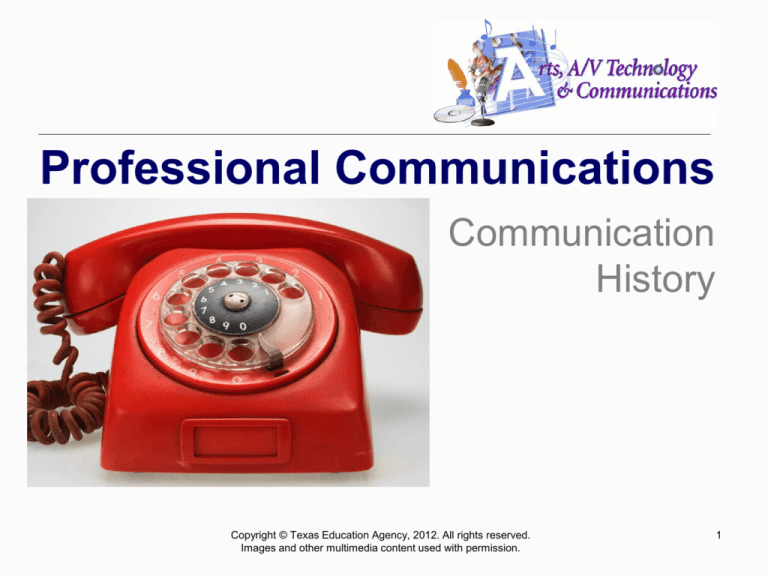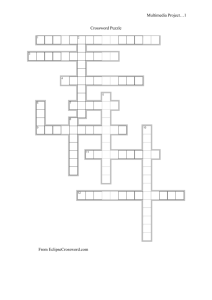
Professional Communications
Communication
History
Copyright © Texas Education Agency, 2012. All rights reserved.
Images and other multimedia content used with permission.
1
What is Communication?
Communication
The process of creating and exchanging
meaning through symbolic interaction.
Verbal communication
Communication in the form of spoken
or written words.
Nonverbal communication
Communication in the form of gestures,
eye contact, or tone of voice.
Copyright © Texas Education Agency, 2012. All rights reserved.
Images and other multimedia content used with permission.
2
Non Verbal: Sound
Drums were one way to send
signals to neighboring tribes
and groups. Different
drumming patterns would tell
them of concerns and events
they needed to know.
Copyright © Texas Education Agency, 2012. All rights reserved.
Images and other multimedia content used with permission.
3
Non Verbal:
Smoke Signals
Smoke signals were another way to send
messages to people who were not close
enough to use words.
Bring
Home
Copyright © Texas Education Agency, 2012. All rights reserved.
Images and other multimedia content used with permission.
Milk
4
Verbal Storytelling
Before the written
word, storytelling was
a way for families and
communities to pass
on information.
Copyright © Texas Education Agency, 2012. All rights reserved.
Images and other multimedia content used with permission.
5
Communication History
Timeline
Speech
Petroglyphs
Cave
Drawings
Copyright © Texas Education Agency, 2012. All rights reserved.
Images and other multimedia content used with permission.
Pictograms
6
Speech
Speech is the expression of,
or the ability to express
thoughts and feelings by
articulate sounds.
Human communication was
revolutionized by speech.
Copyright © Texas Education Agency, 2012. All rights reserved.
Images and other multimedia content used with permission.
7
Symbols
Symbol - Something that
represents or stands for
something else
The imperfection of speech
resulted in the creation of
new forms of
communication, improving
both the range at which
people could communicate
and the longevity of the
information.
Copyright © Texas Education Agency, 2012. All rights reserved.
Images and other multimedia content used with permission.
8
Cave Drawings
Around 30,000 BC
murals were
painted on cave
walls that told
stories of battles,
hunts, and culture.
Copyright © Texas Education Agency, 2012. All rights reserved.
Images and other multimedia content used with permission.
9
Petroglyphs
Around 10,000 BC
images were
created by
removing part of a
rock surface by
incising, pecking,
carving, and
abrading.
Copyright © Texas Education Agency, 2012. All rights reserved.
Images and other multimedia content used with permission.
10
Pictograms
9,000 BC saw the
development of
pictures that
represent an object
or an idea.
Copyright © Texas Education Agency, 2012. All rights reserved.
Images and other multimedia content used with permission.
11
Ideogram
A written character that symbolizes the idea of a thing
without indicating the sounds used to say it, e.g.,
numerals and Chinese characters.
Copyright © Texas Education Agency, 2012. All rights reserved.
Images and other multimedia content used with permission.
12
Writing
a sequence of
letters, words, or
symbols marked on
paper or other
surface
appeared around
2700 BC
Copyright © Texas Education Agency, 2012. All rights reserved.
Images and other multimedia content used with permission.
13
Alphabet
a set of letters or
symbols in a fixed order
used to represent the
basic sounds of a
language
in particular, the set of
letters from A to Z
1700 BC
Copyright © Texas Education Agency, 2012. All rights reserved.
Images and other multimedia content used with permission.
14
The Printing Press
Johann Gutenburg invented an actual printing
press in 1450
Gutenburg was the first to use a press to print
the Bible, the oldest full
length volume printed.
From Gutenburg's press in
Mainz, Germany, printing
spread all over Europe.
Copyright © Texas Education Agency, 2012. All rights reserved.
Images and other multimedia content used with permission.
15
Typewriter
In 1714 an Englishman, Henry Mill, received
the first patent for a typewriter.
Copyright © Texas Education Agency, 2012. All rights reserved.
Images and other multimedia content used with permission.
16
Telegraph
1831 Joseph Henry invents the first electric telegraph.
1832 Samuel Morse invents Morse Code.
Copyright © Texas Education Agency, 2012. All rights reserved.
Images and other multimedia content used with permission.
17
Telephone
Alexander Graham Bell
invented the telephone in
Boston in 1876. One
hundred twenty years later
there are over 360 million
telephone numbers, and
that figure grows each
year.
Copyright © Texas Education Agency, 2012. All rights reserved.
Images and other multimedia content used with permission.
18
Computer
1951, The first commercially
available, “mass produced”
electronic computer entered
the market
The computer was
manufactured in the United
States.
Copyright © Texas Education Agency, 2012. All rights reserved.
Images and other multimedia content used with permission.
19
Online Sources
In 1973 a global computer
network emerged,
providing a variety of
information and
communication facilities.
These interconnected
networks use standardized
communication protocols.
Copyright © Texas Education Agency, 2012. All rights reserved.
Images and other multimedia content used with permission.
20
Emails
Short for “electronic mail,”
email is a means of
sending messages online.
Email also allows you to
send files as attachments
to email messages.
Copyright © Texas Education Agency, 2012. All rights reserved.
Images and other multimedia content used with permission.
21
Online calling
2003 - Software that
allows you to call
people on their
computers or phones.
Copyright © Texas Education Agency, 2012. All rights reserved.
Images and other multimedia content used with permission.
22




